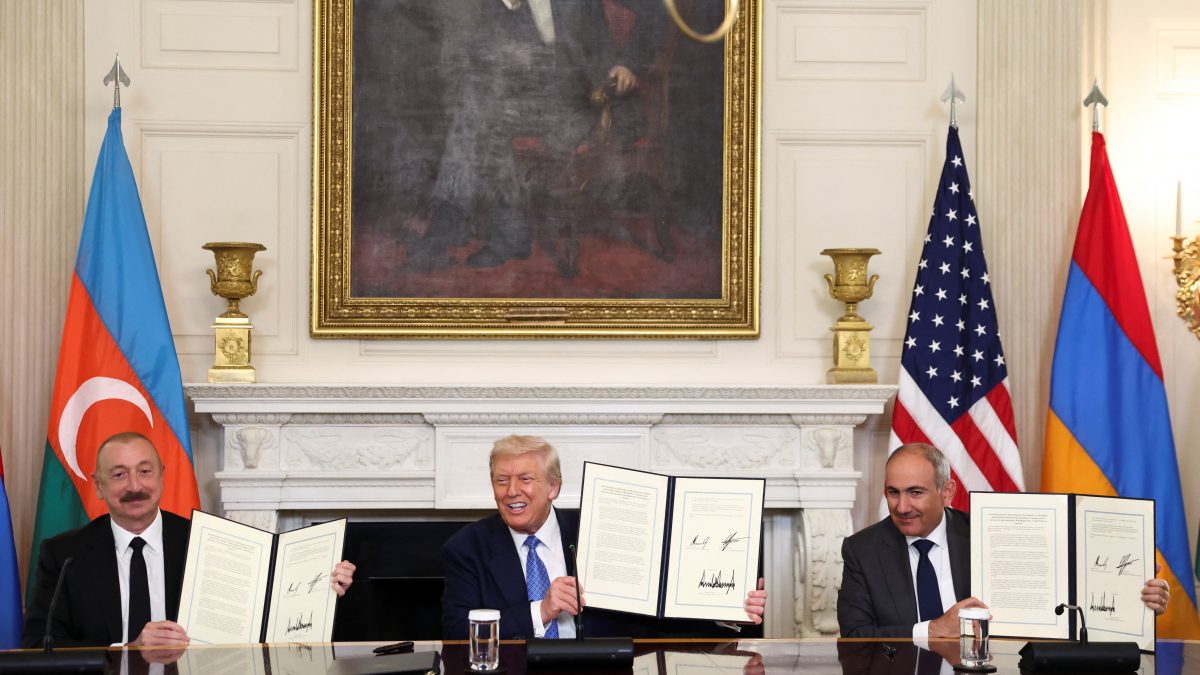A peace push backed by US President Donald Trump leaves Azerbaijan and Armenia just one step from a final peace deal and is a paradigm shift in the strategically important South Caucasus region, a top Azerbaijani diplomat said on Saturday.
Trump welcomed Azerbaijani President Ilham Aliyev and Armenian Prime Minister Nikol Pashinyan in the White House on Friday and witnessed their signing of a joint declaration aimed at drawing a line under their decades-long on-off conflict.
Russia, a traditional broker and ally of Armenia in the strategically important South Caucasus region which is crisscrossed with oil and gas pipelines, was not included despite its border guards being stationed on the border between Armenia and Iran.
While Moscow said it supported the summit, it proposed “implementing solutions developed by the countries of the region themselves with the support of their immediate neighbours – Russia, Iran and Turkey” to avoid what it called the “sad experience” of Western efforts to mediate in the Middle East.
Azerbaijan’s close ally, NATO member Turkey, welcomed the accord. Russia-ally Iran also welcomed the agreement but warned against any foreign intervention near its borders.
Baku and Yerevan have been at odds since the late 1980s when Nagorno-Karabakh, a mountainous Azerbaijani region mostly populated by ethnic Armenians, broke away from Azerbaijan with support from Armenia. Azerbaijan took back full control of the region in 2023, prompting almost all of the territory’s 100,000 ethnic Armenians to flee to Armenia.
Impact Shorts
More Shorts“The chapter of enmity is closed and now we’re moving towards lasting peace,” said Elin Suleymanov, Azerbaijan’s ambassador to Britain, predicting that the wider region’s prosperity and transport links would be transformed for the better.
“This is a paradigm shift,” said Suleymanov, who as a former envoy to Washington who used to work in President Aliyev’s office, is one of his country’s most senior diplomats.
Suleymanov declined to speculate on when a final peace deal would be signed however, noting that Aliyev had said he wanted it to happen soon.
There remained only one obstacle, said Suleymanov, which was for Armenia to amend its constitution to remove a reference to Nagorno-Karabakh.
“Azerbaijan is ready to sign any time once Armenia fulfils the very basic commitment of removing its territorial claim against Azerbaijan in its consitution,” he said.
Many questions unanswered
Pashinyan this year called for a referendum to change the constitution, but no date for it has been set yet. Armenia is to hold parliamentary elections in June 2026, and the new constitution is expected to be drafted before the vote.
The Armenian leader said on X that the Washington summit would pave the way to end the decades of conflict and to open up transport connections in the region that he said would unlock strategic economic opportunities.
Friday’s agreement saw Armenia hand exclusive US development rights to a strategic transit corridor through the South Caucasus that the White House said would facilitate greater exports of energy and other resources.
The proposed Trump Route for International Peace and Prosperity (TRIPP) which would run across southern Armenia, would give Azerbaijan a direct route to its exclave of Nackchivan and in turn to Turkey.
Asked when the transit rail route would start running, Suleymanov said that would depend on cooperation between the US and Armenia whom he said were already in talks.
Joshua Kucera, Senior South Caucasus analyst at International Crisis Group, said the Washington summit was not the easy win that Trump may have hoped for as the agreements left many questions unanswered.
The issue of Armenia’s constitution continued to threaten to derail the process, and key questions about how the new transport corridor would work in practice had not been addressed.
“Key details are missing, including about how customs checks and security will work and the nature of Armenia’s reciprocal access to Azerbaijani territory. These could be serious stumbling blocks,” said Kucera.
Control of the corridor, which will be operated under Armenian law, is a sensitive issue, with Azerbaijan wary of Armenian law.
Suleymanov played down suggestions that Russia, which still has extensive security and economic interests in Armenia, was being disadvantaged.
“Anybody and everybody can benefit from this if they choose to,” he said.
)